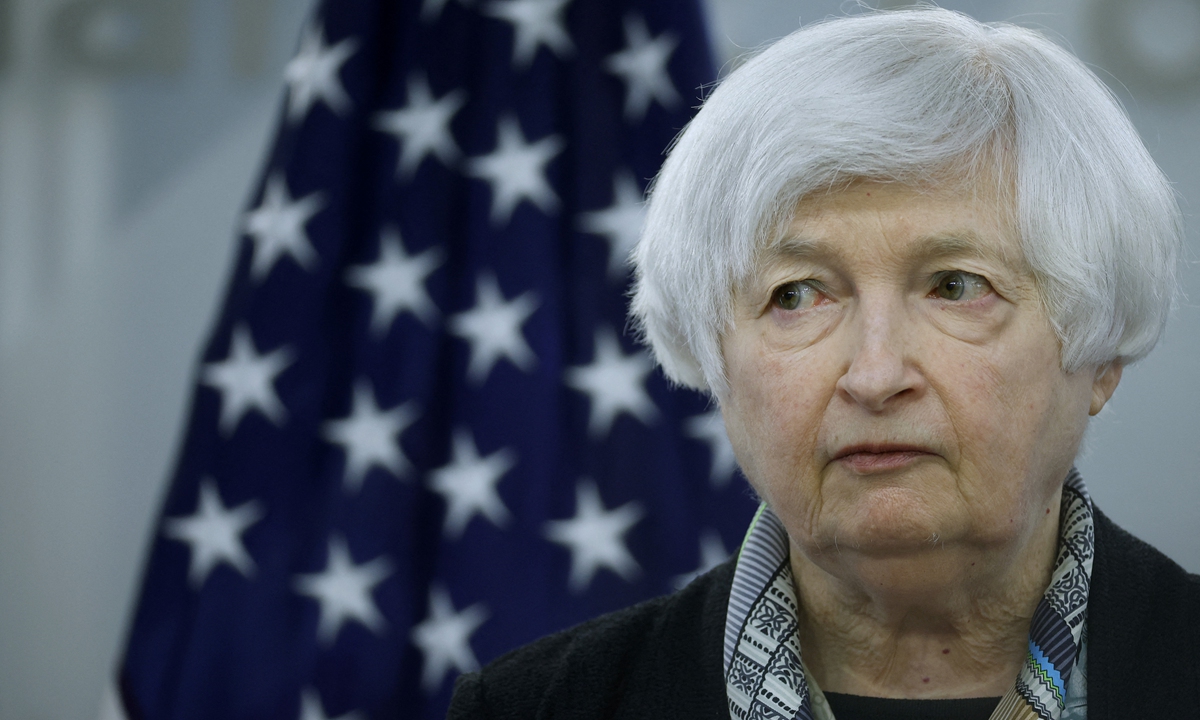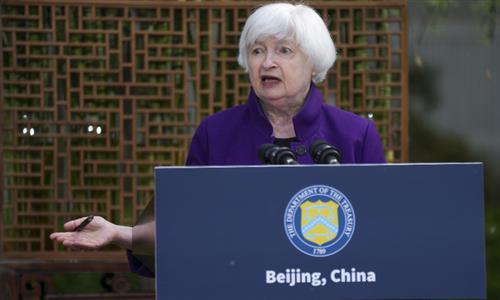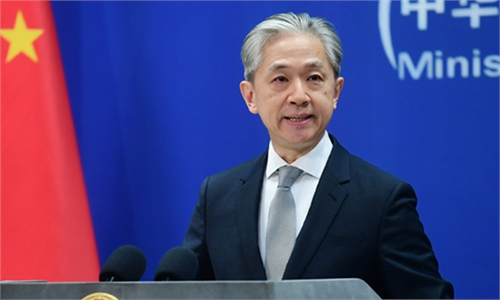Chinese experts slam US Treasury Secretary’s ‘groundless’ accusations against China

US Treasury Secretary Janet Yellen addresses an Atlantic Council Front Page event on April 13, 2022 in Washington, DC. Photo: AFP
Chinese experts on Friday refuted US Treasury Secretary Janet Yellen's accusations against China's supply chains and trade policies, calling them groundless clichés aimed at cracking down on China and shifting blame for the US administration's incompetence in handling domestic industrial development and global competition.
During a speech on Thursday, Yellen asserted that Chinese "over-concentrated supply chains" threaten US jobs and investments in its green energy sector, and that China's trade policies "may interfere significantly with our efforts to build a healthy economic relationship," the Associated Press reported.
Yellen made the remarks in a speech to Wall Street and business executives at the Economic Club of New York, where she also advocated for the Biden administration's policies designed to spur US economic competitiveness, according to the report.
Chinese experts said that Yellen's claims are a blatant attempt to distort facts and shift blame, as the US is the one violating international trade rules and imposing unjust hegemonic sanctions on other countries, including China. While the US' moves are aimed at containing China's rise, they will not hold China back and will instead backfire on the US itself, they said.
The US' rhetoric and moves aim to undermine China's leading industries in global competition, as the US administration has effectively acknowledged its diminishing technological edge compared to China, Zhou Mi, a senior research fellow at the Chinese Academy of International Trade and Economic Cooperation, told the Global Times on Friday.
In stark contrast to the US' unilateralism and protectionism, which will severely harm the global economy and weaken market confidence, China has always persisted in continuously expanding opening-up, facilitating trade and investment, and creating more business opportunities for foreign companies, Zhou said.
In May, the US imposed major new tariffs on a range of Chinese imports, including electric vehicles (EVs), advanced batteries, solar cells, steel, aluminum, and medical equipment.
Then on Wednesday, the US Treasury Department released a new anti-Russia sanctions package that includes more than 300 companies, banks, and dozens of individuals from Russia and other countries, including China, according to Reuters.
China's Foreign Ministry on Thursday urged the US to immediately stop imposing illegal unilateral sanctions against Chinese entities and vowed that China will take all measures necessary to firmly safeguard the lawful rights and interests of Chinese companies and citizens.
Experts viewed the US sanctions as a vivid example of the US' intensifying hegemonism and protectionism.
Economic theory has repeatedly proven that free trade and globalization benefit all participants, Gao Lingyun, an expert at the Chinese Academy of Social Sciences, told the Global Times on Friday, attributing the US' challenges in global competitiveness in emerging industries to its internal distribution issues or lagging industrial transformation.
Gao emphasized that these challenges should be directly and actively confronted by the US government and addressed with constructive solutions rather than blaming China.
Yellen and other US officials have recently escalated their fallacious claims of overcapacity targeting the Chinese EV industry and continuously smeared China's trade policies. During her speech on Thursday, Yellen once again asserted that Chinese government subsidies are driving the rapid expansion in Chinese EVs, batteries, and solar energy equipment.
Gao highlighted that the rapid advancement of China's EV sector and other competitive industries largely stems from the country's expansive domestic market and fierce market competition.
"The West's accusations are logically flawed, as the growth of emerging industries depends primarily on fostering strong market demand rather than relying on protectionist measures," Gao said.



